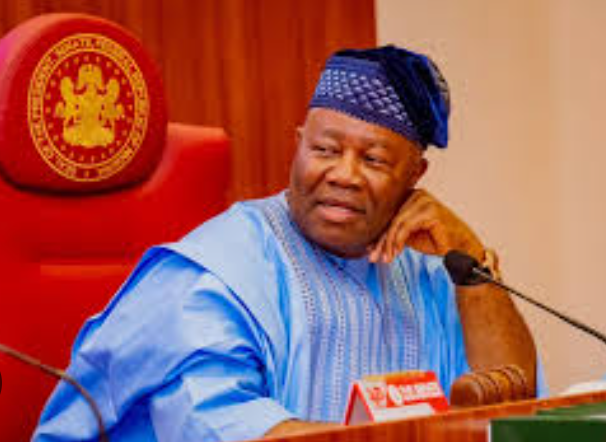
Godswill Akpabio Defiantly Rejects Calls for Resignation Amid Controversy

Senate President Godswill Akpabio has categorically refused to resign despite mounting calls for him to step down over allegations that he describes as false. Addressing the Senate plenary on Thursday in Abuja, Akpabio firmly stated that he would not be pressured into resignation based on baseless accusations.
The controversy arose following remarks by Senate Leader Opeyemi Bamidele, who commended the Senate for maintaining its focus amid external criticism. “Mr. President, those who felt that you should have stepped down can now see that this Senate remains focused,” Bamidele stated, applauding the passage of several tax reform bills. However, before Bamidele could finish, Akpabio interjected with an assertive declaration: “I will not step down over false allegations.”
Akpabio’s response was unequivocal. “Who told you I was going to step down? I am not one of those people who would step down over false allegations, and when it is eventually proven that the allegations were false, they’ll say, ‘Oh, we were unfair to Akpabio.’ No! I am not that bad. If you have that in mind, cancel it!” he exclaimed. His defiant stance signaled his unwillingness to be swayed by what he perceives as baseless rumors and speculative narratives.
Although Akpabio did not specify the nature of the allegations, his remarks appeared to be an indirect reference to a recent Court of Appeal decision in Calabar. The court upheld the 2021 conviction of Professor Peter Ogban, who was found guilty of manipulating the 2019 senatorial election results in favor of Akpabio. Despite Akpabio not being directly convicted, the ruling has reignited debates regarding his political integrity, especially since he returned to win a Senate seat in 2023 and ascended to the position of Senate President.
In light of the court’s decision, several critics, including civil society organizations and online commentators, have demanded Akpabio’s resignation. They argue that the court’s ruling, despite not directly implicating Akpabio, casts doubt on his moral authority to hold such a significant office. The growing pressure from various quarters has sparked discussions on social media, with many questioning the credibility of Akpabio’s leadership.
Nevertheless, Akpabio has dismissed these calls as mere distractions, orchestrated by individuals intent on undermining the National Assembly’s stability. He remained resolute, emphasizing that he would continue to lead the Senate with unwavering commitment. “Let the dreamers dream,” Akpabio remarked, conveying his intent to focus on legislative duties rather than engage in what he considers groundless criticisms.
The controversy has undoubtedly added to the political tension within the National Assembly, as some senators and political analysts have expressed concerns over the potential impact on the Senate’s image. Yet, Akpabio’s supporters argue that the calls for resignation are politically motivated and lack substantial grounds. They believe that the Senate President’s firm stance demonstrates leadership and determination in the face of adversities.
Supporters of Akpabio point out that the mere association with the Court of Appeal ruling should not disqualify him from his position. They emphasize that he was not personally convicted and that the political landscape often involves attempts to discredit prominent figures through indirect associations. Moreover, they argue that his leadership so far has been characterized by legislative progress, as evidenced by the successful passage of tax reform bills under his watch.
Amid the debate, some political analysts caution against hasty judgments, pointing out that resignation calls based on perceived associations rather than direct culpability may set a dangerous precedent. They stress that while public office holders must maintain moral and ethical standards, it is equally important to uphold the principle of fairness when evaluating leadership.
Critics, on the other hand, argue that the perception of compromised integrity can be just as damaging as actual guilt. They believe that Akpabio should consider stepping aside to allow a thorough investigation to proceed without any perception of bias. To them, the credibility of the Senate and the broader political system is at stake, and maintaining public trust should be prioritized.
As the controversy continues, the situation raises broader questions about the intersection of law, politics, and public perception in Nigeria. While the legal outcome did not directly implicate Akpabio, the moral and political implications continue to reverberate, leading to passionate debates among citizens and political stakeholders alike.
For now, Akpabio remains steadfast, determined to stay in office despite the ongoing controversy. Whether his unwavering stance will ultimately be vindicated or further challenged remains uncertain, but one thing is clear: the discourse surrounding his leadership has sparked a renewed conversation about accountability, representation, and the burden of political office in Nigeria’s evolving democratic landscape.


